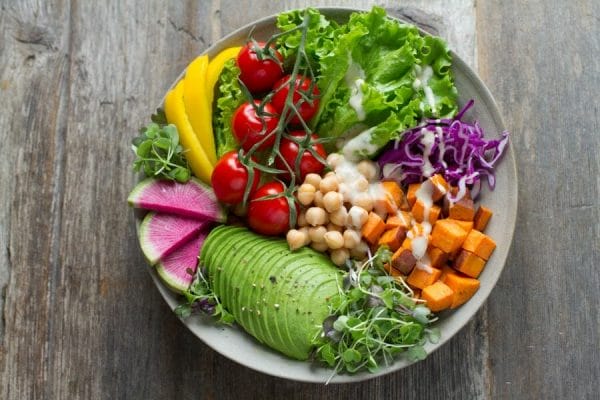Food and mental health connection? 3 Things You Should Know About the Gut-Brain Connection


DIET ADJUSTMENTS ARE COMMONLY PRESCRIBED FOR PHYSICAL AILMENTS BUT HAVE YOU EVER WONDERED IF THE FOOD YOU ARE EATING IS Affecting Your Mental Health?
If your first thought is “that seems a little far-fetched”, you’re not the only one that thinks that off the bat. If I’m being honest, the connection between the gut and psychological well-being seemed far-fetched when I began studying psychiatry. I’ve quickly learned that there is not only a connection but an intimate relationship that we are only beginning to uncover.
If you knew you could improve your mood, stress levels, energy, longevity, and overall wellness by addressing the healing powers of your gut, would you? If the answer is yes, stick with me. I have a “gut feeling” it’s going to be a game-changer (see what I did there).

THE HISTORY OF THE GUT-BRAIN CONNECTION
A quick overview of the history and how we got back to this conversation that started long ago:
- More than 2,000 years ago, the Greek physician Hippocrates suggested that all disease begins in the gut.
- 1850’s we discovered there was bacteria in the gut.
- Early 1900’s physicians were claiming to treat “melancholia” or depression with things such as sour milk or kefir.
- 1930s, Sigmund Freud’s emphasis on the unconscious mind dominated modern thought on psychological health.
- Then enter antidepressants, introduced in the 1950’s.
The conversation of the mind-gut connection all but dwindled as people were blind to holistic measures by the promises of a quick fix and chemical antidepressants – that is until now.
As we discover long-term side effects and dependency of antidepressant medications, scientists are now more intrigued than ever to learn more about the gut-brain connection. Scientists are discovering promising outcomes and undeniable connections while simultaneously trying to slow the steep increase in mental illness.
Although psychiatric medications have their place in some situations and conditions, we were long blinded to the numerous other treatment options that can improve mental health conditions.
Stress, Anxiety and stomach pain? here's the reason
Have you ever had butterflies in your stomach? Belly issues before a big event or stressful situation? This is no coincidence, mama. The same neurotransmitters that are responsible for some of our big feelings are produced and live primarily in our gut!
When a patient is placed on an SSRI, the most common type of medication for anxiety and depression, the most common side effect is gastrointestinal upset. Why? Well, because 95% of our serotonin resides in our gut! Is it starting to make sense?
Chronic stress and anxiety can lead to low-level inflammation which creates a disease-state in our bodies, giving rise to a plethora of physical ailments. True health is a balance of both mental and physical health– since you truly can’t have one without the other. Sure, I understand psychological and emotional health issues may be a complicated puzzle of causes, but what if we looked at our diet as one of the pillars to mental wellness alongside other therapeutic measures?

The American Diet and mental health
Diet adjustments are a rather common prescription when it comes to concerns for our physical health. So, what if it became common practice to include the foods we eat in our pursuit of mental well-being? Could we slow the decline of mental health issues in our world? In our children?
In a recent study with over 7,000 adolescents, teens with the lowest quality diets were 79% more likely to get depressed. Let’s help them stay ahead of their mental health while improving ours alongside them!
According to Dr. Drew Ramsey, a nutritional psychiatrist, women who follow a standard American diet (sometimes called SAD or the Western diet, characterized by ultra-processed foods, excess refined sugar, and unhealthy fats) are 30% more likely to suffer from various mental disorders.
You can consider trying an elimination diet to see what foods affect your energy, stress levels, and emotions most but you don’t have to go cold-turkey. You may have foods you love that might be contributing to your mental wellbeing so it’s worth investigating further.
This is to provide a reminder that you really are what you eat. You can still enjoy your favorite dessert or that glass of red wine with dinner. This education and the hope of connecting the dots is about bringing awareness to everyday habits that, compounded day after day, can contribute to poor mental and physical health.
Interested but overwhelmed? Here is a snapshot of our top 5 foods to implement and top 5 foods to consider eliminating.
TRY THIS!
- Probiotic-rich yogurt
- Avocado
- Dark chocolate
- Leafy greens
- Salmon
NIX THIS!
- Fried food
- Soda
- Processed meats (hot dogs, deli meats)
- Red dye
- Refined grains (white rice, pastries,
white bread)
Want a more robust grocery list and guidance on what to buy and what to consider eliminating? We have a full download available, submit your email HERE & we’ll send it directly to your inbox.
Related Posts

Lauren Hays, PMHNP
Lauren was a licensed and trained registered nurse in the NICU and has since made a career shift to focus on mental health. Lauren is now a board certified Psychiatric Mental Health Nurse Practitioner, focusing on women’s health and wellness. She is a mom of three precious little men who has turned her pain into passion.



